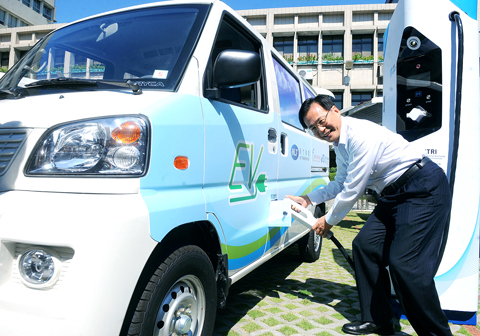Eyeing the potential of a possible mass uptake of electric vehicles, Taiwanese companies are readying themselves to break into the supply chain with their own parts and components.
E-One Moli Energy Corp (能元科技), Taiwan’s leading maker of lithium-ion battery cells used in laptops, is diversifying into the production of vehicle cells, in hopes of capitalizing on the business opportunity posed by the new vehicle trend.
“Vehicle cells will be our next engine of business growth,” said Richard Fan (范譽騰), E-One’s sales project manager, on the sidelines of a technology showcase organized by the Ministry of Economic Affairs (MOEA).

PHOTO: WANG MIN-WEI, TAIPEI TIMES
The ministry yesterday invited a number of vendors from across the electric vehicle supply chain. They included component manufacturers, solutions providers and companies planning to adopt green vehicles.
E-One is a major supplier of laptop battery cells to Simplo Technology Co (新普科技) and DynaPack International Technology Corp (順達), who then package those cells into battery packs.
“The production capacity of rivals such as Samsung SDI is 10 times bigger than ours. We have to find a niche,” Fan said.
The company therefore made a foray into battery cells for power tools and electric vehicles as early as 2005 and expects sales contribution from vehicle cells to rise when more people are driving the green cars.
It is estimated that one electric car will require about 6,000 cells.
One of E-One’s major clients is BMW, for whom it has been supplying cells for the Mini D model for two years.
Chroma Ate Inc (致茂電子), a power supply testing equipment maker, has also been involved in electric vehicle component production for more than three years.
The company is churning out power controllers for clients like Tesla Motors. It hopes to land new orders from Chinese car manufacturers by the end of the year, said engineer Darren Su (蘇沛芃), adding that negotiations are underway with Shanghai General Motors Co (上海通用汽車).
Chroma is also planning to manufacture charging stations for electric vehicles, he added.
Meanwhile, China Steel Corp (中鋼) has initiated a NT$10 million (US$312,500) one-year project to modify its current fleet of 1,000 trucks into electric-powered models.
“Saving energy and reducing carbon dioxide emissions are the major concerns for the project,” said Tsai Song-jau (蔡松釗), general manager of China Steel’s iron and steel research and development department.
Two trucks will be powered by electricity after the project and they will ferry goods at internal sites, he said.
The feasibility of converting the whole fleet into electric-powered vehicles will be studied after that, Tsai added.
The ministry yesterday encouraged more Taiwanese firms to seize the opportunities presented by the booming electric vehicle sector and singled out commercial trucks as an example.
Citing statistics from Fourin Inc — a Japan-based research and publishing company that specializes in the global automotive industry — the ministry said the global market size for commercial trucks is 12 million units a year, while those in Taiwan hit 20,000 units annually.
“The whole car production or component manufacturing in this sector gives Taiwanese firms massive business potential,” the ministry said.

SEMICONDUCTORS: The German laser and plasma generator company will expand its local services as its specialized offerings support Taiwan’s semiconductor industries Trumpf SE + Co KG, a global leader in supplying laser technology and plasma generators used in chip production, is expanding its investments in Taiwan in an effort to deeply integrate into the global semiconductor supply chain in the pursuit of growth. The company, headquartered in Ditzingen, Germany, has invested significantly in a newly inaugurated regional technical center for plasma generators in Taoyuan, its latest expansion in Taiwan after being engaged in various industries for more than 25 years. The center, the first of its kind Trumpf built outside Germany, aims to serve customers from Taiwan, Japan, Southeast Asia and South Korea,

Gasoline and diesel prices at domestic fuel stations are to fall NT$0.2 per liter this week, down for a second consecutive week, CPC Corp, Taiwan (台灣中油) and Formosa Petrochemical Corp (台塑石化) announced yesterday. Effective today, gasoline prices at CPC and Formosa stations are to drop to NT$26.4, NT$27.9 and NT$29.9 per liter for 92, 95 and 98-octane unleaded gasoline respectively, the companies said in separate statements. The price of premium diesel is to fall to NT$24.8 per liter at CPC stations and NT$24.6 at Formosa pumps, they said. The price adjustments came even as international crude oil prices rose last week, as traders

POWERING UP: PSUs for AI servers made up about 50% of Delta’s total server PSU revenue during the first three quarters of last year, the company said Power supply and electronic components maker Delta Electronics Inc (台達電) reported record-high revenue of NT$161.61 billion (US$5.11 billion) for last quarter and said it remains positive about this quarter. Last quarter’s figure was up 7.6 percent from the previous quarter and 41.51 percent higher than a year earlier, and largely in line with Yuanta Securities Investment Consulting Co’s (元大投顧) forecast of NT$160 billion. Delta’s annual revenue last year rose 31.76 percent year-on-year to NT$554.89 billion, also a record high for the company. Its strong performance reflected continued demand for high-performance power solutions and advanced liquid-cooling products used in artificial intelligence (AI) data centers,

SIZE MATTERS: TSMC started phasing out 8-inch wafer production last year, while Samsung is more aggressively retiring 8-inch capacity, TrendForce said Chipmakers are expected to raise prices of 8-inch wafers by up to 20 percent this year on concern over supply constraints as major contract chipmakers Taiwan Semiconductor Manufacturing Co (TSMC, 台積電) and Samsung Electronics Co gradually retire less advanced wafer capacity, TrendForce Corp (集邦科技) said yesterday. It is the first significant across-the-board price hike since a global semiconductor correction in 2023, the Taipei-based market researcher said in a report. Global 8-inch wafer capacity slid 0.3 percent year-on-year last year, although 8-inch wafer prices still hovered at relatively stable levels throughout the year, TrendForce said. The downward trend is expected to continue this year,